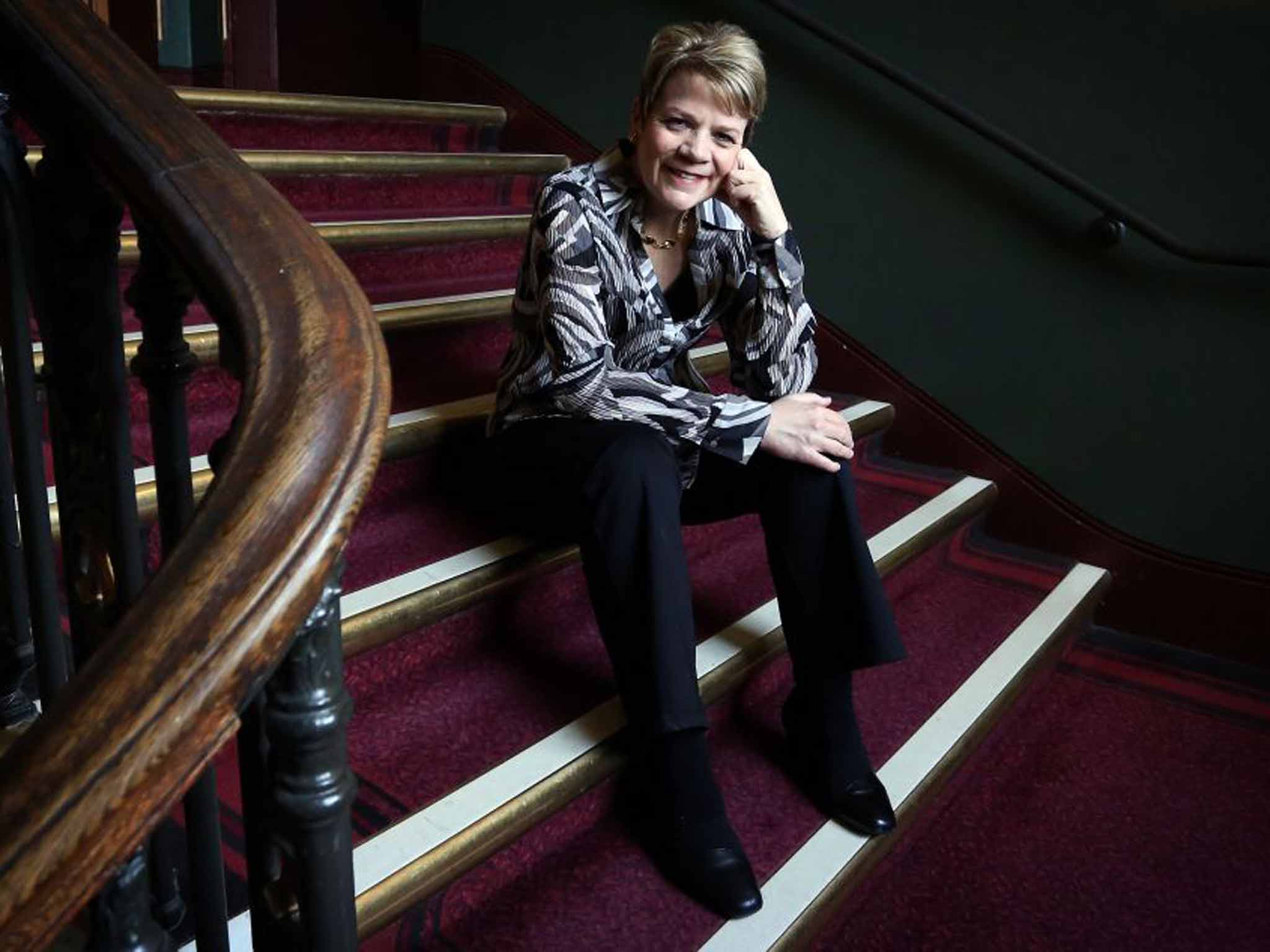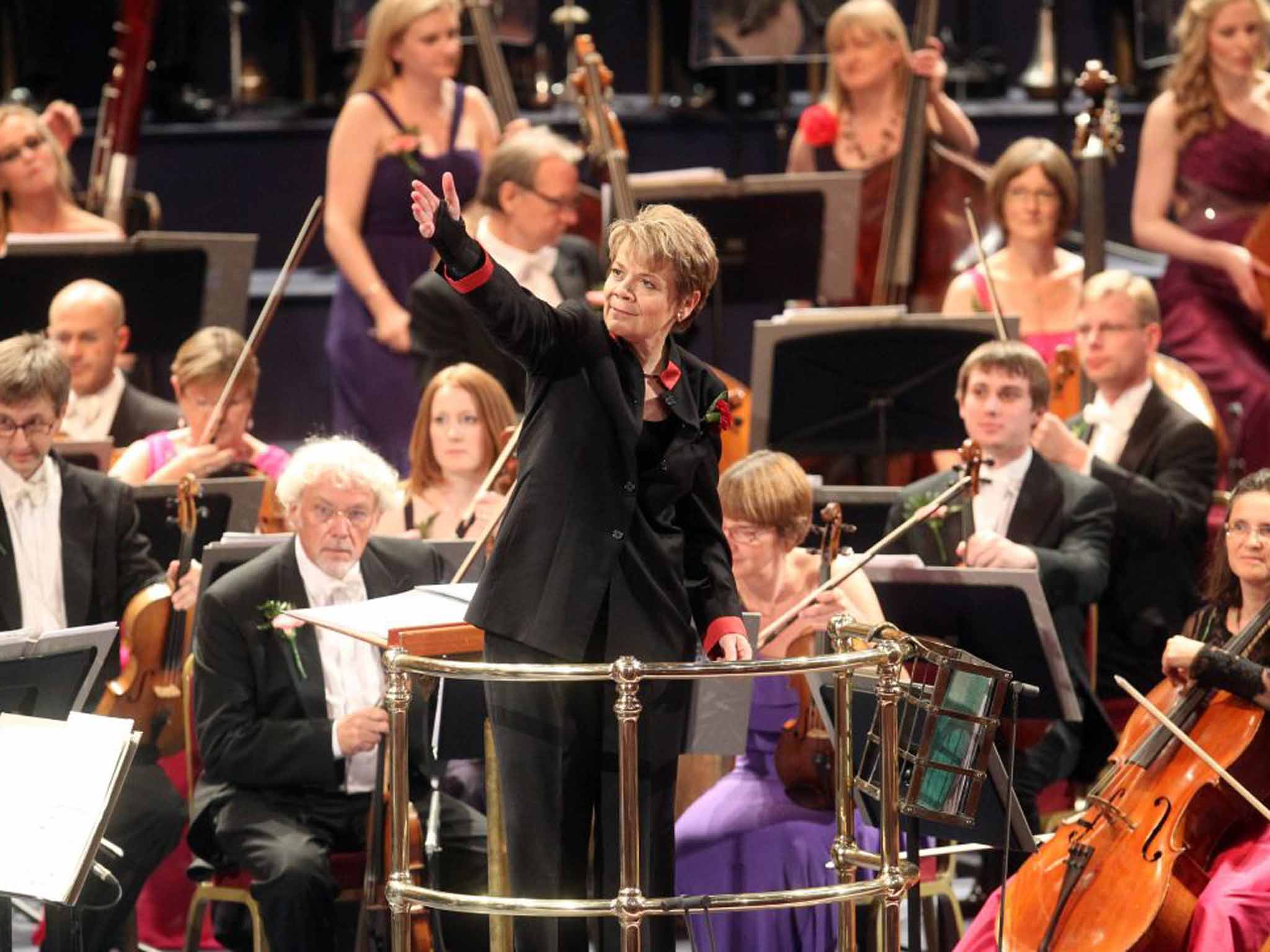How Marin Alsop's classes for young women conductors are changing the face of the profession
It's all about being powerful without apologising for it, she tells Jessica Duchen

When Marin Alsop stepped on to the podium to conduct the Last Night of the Proms in 2013, surrounded by pink balloons, the heady applause that greeted her masked the gentle cracking of a glass ceiling. She was the first woman ever to wield the baton over the highest-profile event in the UK's musical calendar. Last summer she did it again.
Alsop, 59, is the only female conductor who is virtually a household name. In February she is back in the UK to conduct the Orchestra of the Age of Enlightenment (OAE), first in Basingstoke and then in the Changing Minds weekend at the Royal Festival Hall, which is placing the music of Schumann centre stage in its exploration of mental illness and the arts. I caught up with Alsop when she was here recently to give an afternoon of masterclasses for young women conductors arranged by the Southbank Centre, where she is artist-in-residence.
Some conductors who are female are outraged if one raises “the women conductors thing”. Why are we still talking about this? Isn't it time to forget it and just get on with making music? Alsop, though, faces the issue head on – and she is perfectly happy to bring it out into the open.
“People ask why a course like this is necessary, and I think it's a disingenuous question,” she says. “It's only necessary because of the reality. It's not something I'm making up. I'm just reacting to the landscape.” There is no point, she suggests, trying to deny that there are too few women conductors, or that they face problems different from those experienced by their male colleagues – both in terms of that glass ceiling protecting prestigious posts and in how the details of their artistry are perceived.
“Because I have quite a thick skin, I don't mind being the one out front, trying to elbow my way in,” she adds. “But I think, as that person out front, it's important for me to create a pathway for people coming through. I don't want it to be so hard for the next generations.”

She says she is a staunch believer in single-sex educational environments, both in and beyond music. “I think that makes it possible to focus on things that are very specific to that gender,” she suggests. “Conducting is about gesture, and gesture in our world is interpreted differently depending on your gender. If a woman makes a gesture, it is interpreted in a totally different way from a man making the same gesture. Since conducting is all about body language, I think it really is advantageous to be able to speak with women about the reality of how their gestures are interpreted. It's useful to have a safe place to talk about it, where everyone's a woman and we can say, 'That gesture looks girly and it's going to be interpreted in such-and-such a way.'”
She is director of the graduate conducting programme at Johns Hopkins University's Peabody Institute in the US, and of course teaches both men and women. But whenever she takes an all-female class, she declares, she thinks it likely that the main issue will be power. “When I have a class of all men, it's very rarely about power, but more usually about problems with connection. That's a gross generalisation, of course. But I'd bet, from my experience, that the biggest challenge for women would be about how to deliver a gesture that elicits a powerful sound without any kind of apology, and without any kind of associated negative reaction from the musicians.”
Anyone who has ever doubted the different effects of conductors in general on one fine orchestra could do worse than watch a masterclass like this one. The more experienced students, including Valentina Peleggi from Italy, the current holder of the Taki Concordia Conducting Fellowship instigated by Alsop in 2002, quickly create an air of authority and positive energy. Others, shy at first, open up and improve as the session progresses; Alsop's guidance is upfront and encouraging, without dodging the difficult issues.
Each student is tackling Beethoven's Leonora Overture No 3, with the BBC Concert Orchestra; and each has around 10 minutes at a time to rehearse part of the piece under Alsop's watchful gaze. Unexpected details bounce to the surface. One young woman, perhaps trying to appear friendly, begins the overture grinning from ear to ear. “Too smiley,” Alsop advises; a more serious look would serve the student better here. Another takes her turn, but her left hand – which shapes the expression while the right hand beats time – is turned palm downwards. Something as simple as turning the palm up when extending the arm towards the orchestra can transform the gesture's meaning from an order to a welcome. “You're inviting them to make music,” Alsop explains.
Alsop says that her own chief source of encouragement was her parents. Her mother was a professional cellist and her father a violinist: “They were tremendous role models,” she says. “They loved what they did and they were incredibly supportive.” She encountered no female conductors, though; her own mentor-in-chief was Leonard Bernstein, and it was seeing him in action when she was nine years old that sparked her wish to follow in his footsteps. She studied at Yale University and at the Juilliard School of Music in her native New York; later she became a pupil of Bernstein at the Tanglewood Music Centre, which awarded her the Koussevitzky Conducting Prize in 1989. She was already 33 by then and had been working as a violinist. Though pelted with awards in recent years – including the MacArthur Fellowship in the US and numerous record industry accolades – her road to the top has taken time and has undoubtedly had its rocky moments. When she was named music director of the Baltimore Symphony Orchestra in 2005, to assume the post in 2007, the orchestral players were allegedly resentful of the management's approach to her appointment and made public protests about it. She nearly didn't accept the job. Now her work there has been such a success that the orchestra has extended her contract to 2021.
Though she has a home base in Baltimore (her partner, Kristin Jurkscheit, is the director of WOW (Women of the World) Baltimore at Notre Dame University of Maryland) she is constantly travelling, serving as music director of the São Paulo Symphony Orchestra in Brazil and fulfilling numerous guest engagements around the globe, including with the OAE (“I love them – they're really fun to work with and technically very autonomous,” she says). She devotes much energy to teaching and the encouragement of education and outreach, especially in Baltimore, where her efforts have by all accounts been transformative.
But is she changing the face of conducting? Are orchestras finally becoming more receptive to women on the podium, and are young women who aspire to be conductors coming forward in greater numbers? She believes so. “When I look at applicants for my fellowship, the artistic level has really improved,” she says. “This time round we had 60 applicants from 17 countries. So the general level is rising and I think that must be because they are able to gain more experience.”
One female conductor I recently interviewed suggested that a greater number of women conductors could potentially transform the profession's nature, making it less despotic and more collaborative and nurturing. Alsop, though, isn't so sure. She points out that, at least in the US, unionisation has already reduced any tendencies maestros have towards tyranny.
“Maybe I also have an aversion to the idea that because we're women, we're nurturing,” she says. “I think it takes away from our ability to be leaders and be powerful. It doesn't have to be collaborative to be nurturing; you can be in charge, you can be a great boss and not necessarily be checking on everyone's well-being. That said, I do think that women are suited to the more collaborative direction that music is taking today.
“But I don't believe great art is a democratic process. I think you have to have a vision – and to create a vision in a group is a very compromised way to do it. So I urge women to be strong, listen, but stay true to your principles.”
Marin Alsop conducts the Orchestra of the Age of Englightenment at the Anvil, Basingstoke, 4 February (01256 844244), and the Royal Festival Hall, London, 6 February (0207 960 4200)
Join our commenting forum
Join thought-provoking conversations, follow other Independent readers and see their replies
Comments